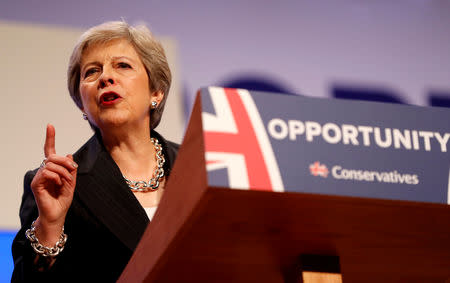Stalemate: Britain's May under growing pressure to rethink Brexit plan
By Elizabeth Piper and William James
LONDON (Reuters) - British Prime Minister Theresa May faces growing pressure on Monday to rethink her plan for leaving the European Union after Brexit talks reached a stand-off at the weekend over the so-called Irish backstop.
Less than six months before Britain leaves the bloc and before May heads on Wednesday to Brussels for a summit when both sides still hope to make progress, the Brexit talks were paused on Sunday after the two sides failed to agree on how to deal with the United Kingdom's only land border with the EU.
May was to make a statement to parliament later on Monday after the weekend talks stumbled over how to prevent the return of a hard border between the British province of Northern Ireland and EU-member Ireland when Britain leaves in its biggest shift in policy for more than 40 years.
May, who has said repeatedly that she could not countenance the breakup of the United Kingdom, is struggling to find a way to satisfy the demands of not only the EU, but of her Conservative Party and her partners in parliament, Northern Ireland's Democratic Unionist Party (DUP).
There has been little success in narrowing that gap, and Irish Foreign Minister Simon Coveney said any deal would now "take a bit more time than many people had hoped".
German Chancellor Angela Merkel also said she had been "very hopeful" that a deal on Britain's exit could be achieved but "at the moment it actually looks a bit more difficult".
But a spokesman for May held out hope, saying there were "a number of means of achieving what we want to achieve" on the backstop. He declined to give details and repeated Britain's view that any such arrangement would be time-limited.
"We need to be able to look the British people in the eye and say the backstop is a temporary solution," he said. "We are not going to be stuck permanently in a single customs territory unable to do meaningful trade deals."
At the weekend, EU sources said London had offered exactly that and urged Brussels to accept assurances that Britain would effectively stay in a customs union to make the backstop unnecessary. The EU said it would still need an insurance policy.
BACKSTOP TO A BACKSTOP
Much will depend on whether May can sell any deal to her Conservative Party and the DUP, which has threatened to pull support from the government if she agrees to different rules for the province.
Sammy Wilson, the DUP's Brexit spokesman, said it now believed a no-deal Brexit was almost inevitable and described the talks in Brussels as turning into a "battle for the union".
May's former foreign minister, Boris Johnson, the figurehead of Britain's Brexit campaign and one of the bookmakers' favourites to replace May, was equally critical.
"In presuming to change the constitutional arrangements of the United Kingdom, the EU is treating us with naked contempt," he wrote in the Telegraph newspaper.
It was that kind of opposition which made it impossible for May's Brexit minister Dominic Raab to agree to a deal in Brussels on Sunday.
British officials said London could not agree to Brussels' demand to have "a backstop to a backstop", which upheld the EU's proposal to keep Northern Ireland in the bloc's customs union if a new trading relationship is not in place in time.
Britain has long said it wants an agreement on a future relationship with the EU, which London sees as including a common rule book for manufactured and agricultural products, which would negate any need for a backstop plan for Ireland.
But British negotiators also say they will honour a commitment to a backstop. This year, the government suggested Britain could apply the EU's external tariffs for a limited period in case of any delay in implementing a Brexit deal.
EU negotiators have criticised that proposal, and said on Sunday it was clear that, as things stood, May did not feel she could get a deal through her cabinet, which meets on Tuesday.
EU officials and diplomats say they will "keep calm and carry on", hoping May can sort out her problems in London.
Some British officials were optimistic of making progress at the EU summit this week, with foreign minister Jeremy Hunt telling reporters in Luxembourg: "There are one or two very difficult outstanding issues but I think we can get there."
"Whether we do this week or not, who knows? But I know everyone is trying incredibly hard."
(Additional reporting by Amanda Ferguson in Belfast, Gabriela Baczynska, Francesco Guarascio, Alastair Macdonald in Brussels and Michelle Martin in Berlin; Editing by Janet Lawrence and David Stamp)



